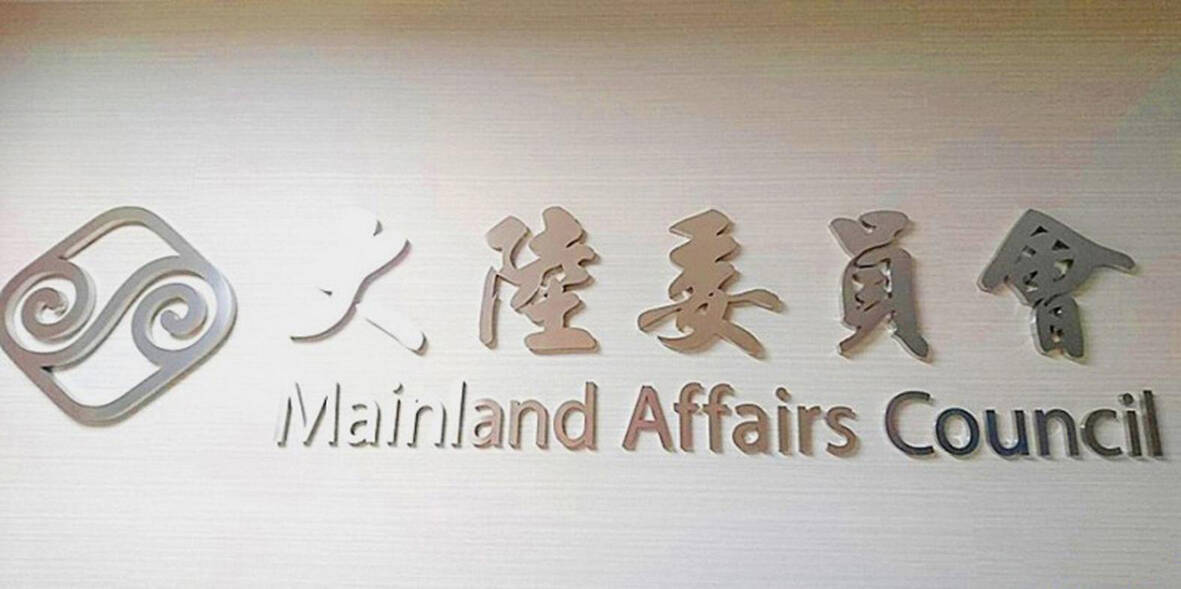The Mainland Affairs Council (MAC) is considering a legal amendment to tighten permanent residency requirements for Hong Kongers.
The changes would extend the minimum period Hong Kongers must stay in Taiwan to become eligible to apply for permanent residency, from one year to at least four years.
The council is considering amending the Regulations Governing Permits for Hong Kong and Macau Residents Entering the Taiwan Area and Setting Up Residence or Registered Permanent Residence in the Republic of China (香港澳門居民進入台灣地區及居留定居許可辦法), a government official said yesterday, speaking on condition of anonymity.

Photo: Chung Li-hua, Taipei Times
Current regulations stipulate that Hong Kong and Macau residents who have lineal relatives or a spouse with a household registration in Taiwan, have received “overseas compatriot education” or contributed to overseas community affairs before the UK or Portugal ended their governance of the territories, invested more than NT$6 million (US$195,185) in Taiwan, or have passed review by a central competent authority can apply for permanent residency after staying in Taiwan “for a period of time.”
The official said the term “for a period of time” means they can apply for naturalization after staying in Taiwan for one year, which is a “quasi-national treatment,” as other foreign nationals must stay for five years before they can apply for naturalization.
Asked why Hong Kong and Macau residents are given special treatment, the official said the government sympathized with Hong Kongers after the territory was returned to China in 1997.
Hong Kong residents who held a Taiwanese identity card before 1997 were considered Taiwanese citizens, so under the special circumstances, the government at the time granted Hong Kongers “quasi-national treatment,” allowing them to be naturalized after staying in Taiwan for one year, the official said.
Hong Kong and Taiwan had a special relationship, but after Beijing implemented the National Security Law in Hong Kong in 2020, breaking its promise of “one country, two systems,” the territory has not been the same, they said.
Democracy, freedom and human rights no longer exist in Hong Kong, democracy advocates have been jailed, district councilors who support Taiwan or democracy have been disqualified and many people from mainland China have migrated to Hong Kong, the official said.
National security agencies are concerned that China might try to infiltrate Taiwan through Hong Kong, they said.
According to the proposed amendment, Hong Kongers born in Hong Kong and with no relatives in mainland China would need to stay in Taiwan for four years before they can apply for permanent residency, the official said.
Mainland Chinese with permanent residency in Hong Kong would need to stay for at least six years before they can apply, similar to Chinese spouses of Taiwanese, they said.

Taiwan is gearing up to celebrate the New Year at events across the country, headlined by the annual countdown and Taipei 101 fireworks display at midnight. Many of the events are to be livesteamed online. See below for lineups and links: Taipei Taipei’s New Year’s Party 2026 is to begin at 7pm and run until 1am, with the theme “Sailing to the Future.” South Korean girl group KARA is headlining the concert at Taipei City Hall Plaza, with additional performances by Amber An (安心亞), Nick Chou (周湯豪), hip-hop trio Nine One One (玖壹壹), Bii (畢書盡), girl group Genblue (幻藍小熊) and more. The festivities are to

Auckland rang in 2026 with a downtown fireworks display launched from New Zealand’s tallest structure, Sky Tower, making it the first major city to greet the new year at a celebration dampened by rain, while crowds in Taipei braved the elements to watch Taipei 101’s display. South Pacific countries are the first to bid farewell to 2025. Clocks struck midnight in Auckland, with a population of 1.7 million, 18 hours before the famous ball was to drop in New York’s Times Square. The five-minute display involved 3,500 fireworks launched from the 240m Sky Tower. Smaller community events were canceled across New Zealand’s

‘SLICING METHOD’: In the event of a blockade, the China Coast Guard would intercept Taiwanese ships while its navy would seek to deter foreign intervention China’s military drills around Taiwan this week signaled potential strategies to cut the nation off from energy supplies and foreign military assistance, a US think tank report said. The Chinese People’s Liberation Army (PLA) conducted what it called “Justice Mission 2025” exercises from Monday to Tuesday in five maritime zones and airspace around Taiwan, calling them a warning to “Taiwanese independence” forces. In a report released on Wednesday, the Institute for the Study of War said the exercises effectively simulated blocking shipping routes to major port cities, including Kaohsiung, Keelung and Hualien. Taiwan would be highly vulnerable under such a blockade, because it

UNDER WAY: The contract for advanced sensor systems would be fulfilled in Florida, and is expected to be completed by June 2031, the Pentagon said Lockheed Martin has been given a contract involving foreign military sales to Taiwan to meet what Washington calls “an urgent operational need” of Taiwan’s air force, the Pentagon said on Wednesday. The contract has a ceiling value of US$328.5 million, with US$157.3 million in foreign military sales funds obligated at the time of award, the Pentagon said in a statement. “This contract provides for the procurement and delivery of 55 Infrared Search and Track Legion Enhanced Sensor Pods, processors, pod containers and processor containers required to meet the urgent operational need of the Taiwan air force,” it said. The contract’s work would be